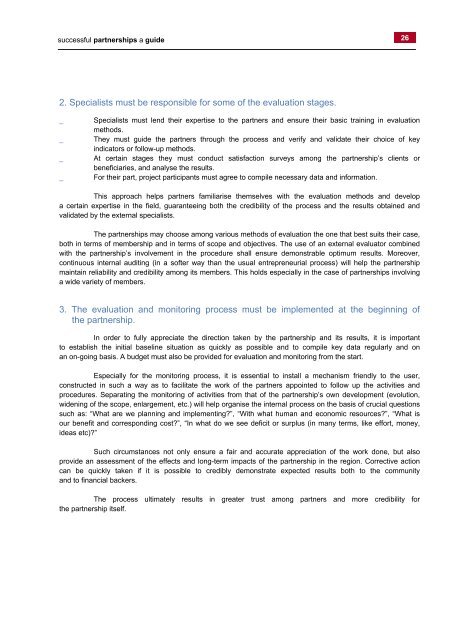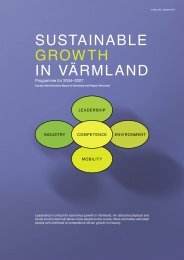successful partnerships a guide - Organisation for Economic Co ...
successful partnerships a guide - Organisation for Economic Co ...
successful partnerships a guide - Organisation for Economic Co ...
Create successful ePaper yourself
Turn your PDF publications into a flip-book with our unique Google optimized e-Paper software.
<strong>successful</strong> <strong>partnerships</strong> a <strong>guide</strong><br />
26<br />
2. Specialists must be responsible <strong>for</strong> some of the evaluation stages.<br />
_<br />
_<br />
_<br />
_<br />
Specialists must lend their expertise to the partners and ensure their basic training in evaluation<br />
methods.<br />
They must <strong>guide</strong> the partners through the process and verify and validate their choice of key<br />
indicators or follow-up methods.<br />
At certain stages they must conduct satisfaction surveys among the partnership’s clients or<br />
beneficiaries, and analyse the results.<br />
For their part, project participants must agree to compile necessary data and in<strong>for</strong>mation.<br />
This approach helps partners familiarise themselves with the evaluation methods and develop<br />
a certain expertise in the field, guaranteeing both the credibility of the process and the results obtained and<br />
validated by the external specialists.<br />
The <strong>partnerships</strong> may choose among various methods of evaluation the one that best suits their case,<br />
both in terms of membership and in terms of scope and objectives. The use of an external evaluator combined<br />
with the partnership’s involvement in the procedure shall ensure demonstrable optimum results. Moreover,<br />
continuous internal auditing (in a softer way than the usual entrepreneurial process) will help the partnership<br />
maintain reliability and credibility among its members. This holds especially in the case of <strong>partnerships</strong> involving<br />
a wide variety of members.<br />
3. The evaluation and monitoring process must be implemented at the beginning of<br />
the partnership.<br />
In order to fully appreciate the direction taken by the partnership and its results, it is important<br />
to establish the initial baseline situation as quickly as possible and to compile key data regularly and on<br />
an on-going basis. A budget must also be provided <strong>for</strong> evaluation and monitoring from the start.<br />
Especially <strong>for</strong> the monitoring process, it is essential to install a mechanism friendly to the user,<br />
constructed in such a way as to facilitate the work of the partners appointed to follow up the activities and<br />
procedures. Separating the monitoring of activities from that of the partnership’s own development (evolution,<br />
widening of the scope, enlargement, etc.) will help organise the internal process on the basis of crucial questions<br />
such as: “What are we planning and implementing”, “With what human and economic resources”, “What is<br />
our benefit and corresponding cost”, “In what do we see deficit or surplus (in many terms, like ef<strong>for</strong>t, money,<br />
ideas etc)”<br />
Such circumstances not only ensure a fair and accurate appreciation of the work done, but also<br />
provide an assessment of the effects and long-term impacts of the partnership in the region. <strong>Co</strong>rrective action<br />
can be quickly taken if it is possible to credibly demonstrate expected results both to the community<br />
and to financial backers.<br />
The process ultimately results in greater trust among partners and more credibility <strong>for</strong><br />
the partnership itself.








